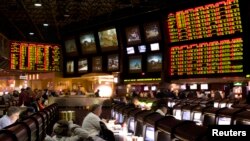WASHINGTON —
Next month’s World Cup in Brazil will not only bring worldwide cheering.
It’s also bound to set off a global betting frenzy – one that now involves international sports of most every kind.
“Taking the illegal [gambling] market, the under-regulated grey market, and the totally legal market together, it’s really close to a trillion dollars [U.S.] annually gambled on sports today,” said Chris Eaton, director of sports integrity for from the International Center for Sport Security in Qatar and the Sorbonne in Paris.
Analysts say that a billion dollars was bet worldwide on the 2010 World Cup title match.
Watch video report:
And, the 2014 playoffs are expected to generate a “handle” [total amount wagered] even higher than that.
Eaton said the betting action on just one football league alone – Britain’s Premiere League – comes to more than a billion dollars a year.
Huge quantities of money attract criminal elements. So it is with sports wagering.
A Sports Security report says that sports betting is used worldwide by organized crime syndicates to launder some $140 billion a year.
It also says 80 percent of the total global sports wagering activity is illegal.
The rise of the Internet over the past 20 years has added even more gambling activity, according to the report, which says the web now handles 30 percent of the action.
Instead of having to seek out illegal bookmakers or go to legitimate betting shops, such as Britain’s Ladbrokes and William Hill, bettors only need a computer and a credit card.
Britain, according to the study, has the greatest number of online gambling licenses – 114 operations. Malta was second, with 86.
Along with making wagering easy, the Internet has enabled criminal elements to set up global betting operations that siphon off and send profits to anonymous bank accounts in lax-regulated countries.
The report also says legal sports betting is only adding about $6 billion to national tax coffers globally, a tiny fraction of the total take.
The ICSS-Sorbonne report says Asia accounts for 53 percent of the world’s illegal gambling, largely because most East Asian countries do not allow legal wagering.
That’s why casinos in places such as Macao attract huge numbers of bettors from mainland China.
And, it turns out that illicit betting shops – “bookmakers” - and legal betting houses are linked together in a form of “risk management” that is similar to what is done in the insurance industry, where big firms backstop the smaller ones.
“So, you’ve got dense networks of street bookmakers throughout countries like China and Vietnam,” said David Forrest, a gambling analyst at the University of Salford in Britain.
“And those small guys tend to take the stake [the money bet] and quickly pass it on up a chain so they don’t handle the risk themselves,” he said. “And at the top of this chain lie legal bookmakers, who are registered in the Philippines - the five biggest bookmakers in the world.”
The Philippines is an international wagering hub because the regulatory environment in that country is relatively weak.
Huge amounts of cash can move in and out without much difficulty, analysts say.
Illegal gambling has taken on some of the practices of Wall Street where hedge fund traders may take positions both for and against a particular stock or security to help ensure that they win regardless of the outcome.
“Illegal bookmakers will collect their bets,” said University of South Florida sports betting analyst Richard Borghesi, “and if they wind up with a negative position on one side or the other, they will lay off [offset] their risk by betting on the opposite teams in the legalized gambling market.”
Borghesi said legal sports betting in Nevada and other locations has made such “hedging” relatively easy.
But skimming cash from “the handle” and other illicit activities are not the only fraud paths.
Analysts Forrest cites a scam that took place in January 2012 that created a fictitious match between Turkmenistan and the Maldives.
The operators posted advertisements for the game to attract bettors, collected cash, and then created a phony “play-by-play broadcast” of the game so gamblers could follow the action.
The final score – Turkmenistan won by 3-2 – was an outcome designed to give the perpetrators the biggest possible take.
The ICSS-Sorbonne study says the sports gambling industry needs to develop international reporting and accountability systems much like those that have been established in recent decades in the global financial markets.
“We need the same sort of cooperative model operating in the gambling side and the bookmaking side of international sports,” said the ICSS’ Eaton. “So we can see exactly who was transacting what – and how – so you can pick [identify] the anomalies.”
It’s also bound to set off a global betting frenzy – one that now involves international sports of most every kind.
“Taking the illegal [gambling] market, the under-regulated grey market, and the totally legal market together, it’s really close to a trillion dollars [U.S.] annually gambled on sports today,” said Chris Eaton, director of sports integrity for from the International Center for Sport Security in Qatar and the Sorbonne in Paris.
Analysts say that a billion dollars was bet worldwide on the 2010 World Cup title match.
Watch video report:
And, the 2014 playoffs are expected to generate a “handle” [total amount wagered] even higher than that.
Eaton said the betting action on just one football league alone – Britain’s Premiere League – comes to more than a billion dollars a year.
Huge quantities of money attract criminal elements. So it is with sports wagering.
A Sports Security report says that sports betting is used worldwide by organized crime syndicates to launder some $140 billion a year.
It also says 80 percent of the total global sports wagering activity is illegal.
The rise of the Internet over the past 20 years has added even more gambling activity, according to the report, which says the web now handles 30 percent of the action.
Instead of having to seek out illegal bookmakers or go to legitimate betting shops, such as Britain’s Ladbrokes and William Hill, bettors only need a computer and a credit card.
Britain, according to the study, has the greatest number of online gambling licenses – 114 operations. Malta was second, with 86.
Along with making wagering easy, the Internet has enabled criminal elements to set up global betting operations that siphon off and send profits to anonymous bank accounts in lax-regulated countries.
The report also says legal sports betting is only adding about $6 billion to national tax coffers globally, a tiny fraction of the total take.
The ICSS-Sorbonne report says Asia accounts for 53 percent of the world’s illegal gambling, largely because most East Asian countries do not allow legal wagering.
That’s why casinos in places such as Macao attract huge numbers of bettors from mainland China.
And, it turns out that illicit betting shops – “bookmakers” - and legal betting houses are linked together in a form of “risk management” that is similar to what is done in the insurance industry, where big firms backstop the smaller ones.
“So, you’ve got dense networks of street bookmakers throughout countries like China and Vietnam,” said David Forrest, a gambling analyst at the University of Salford in Britain.
“And those small guys tend to take the stake [the money bet] and quickly pass it on up a chain so they don’t handle the risk themselves,” he said. “And at the top of this chain lie legal bookmakers, who are registered in the Philippines - the five biggest bookmakers in the world.”
The Philippines is an international wagering hub because the regulatory environment in that country is relatively weak.
Huge amounts of cash can move in and out without much difficulty, analysts say.
Illegal gambling has taken on some of the practices of Wall Street where hedge fund traders may take positions both for and against a particular stock or security to help ensure that they win regardless of the outcome.
“Illegal bookmakers will collect their bets,” said University of South Florida sports betting analyst Richard Borghesi, “and if they wind up with a negative position on one side or the other, they will lay off [offset] their risk by betting on the opposite teams in the legalized gambling market.”
Borghesi said legal sports betting in Nevada and other locations has made such “hedging” relatively easy.
But skimming cash from “the handle” and other illicit activities are not the only fraud paths.
Analysts Forrest cites a scam that took place in January 2012 that created a fictitious match between Turkmenistan and the Maldives.
The operators posted advertisements for the game to attract bettors, collected cash, and then created a phony “play-by-play broadcast” of the game so gamblers could follow the action.
The final score – Turkmenistan won by 3-2 – was an outcome designed to give the perpetrators the biggest possible take.
The ICSS-Sorbonne study says the sports gambling industry needs to develop international reporting and accountability systems much like those that have been established in recent decades in the global financial markets.
“We need the same sort of cooperative model operating in the gambling side and the bookmaking side of international sports,” said the ICSS’ Eaton. “So we can see exactly who was transacting what – and how – so you can pick [identify] the anomalies.”














